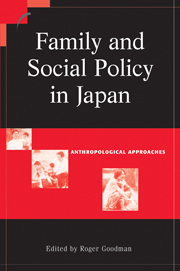Book contents
- Frontmatter
- Contents
- List of Illustrations
- Acknowledgements
- Contributors
- A note to the reader
- 1 Anthropology, policy and the study of Japan
- 2 Toward a cultural biography of civil society in Japan
- 3 Pinning hopes on angels: reflections from an aging Japan's urban landscape
- 4 Reproducing identity: maternal and child healthcare for foreigners in Japan
- 5 State, standardisation and ‘normal’ children: an anthropological study of a preschool
- 6 Child abuse in Japan: ‘discovery’ and the development of policy
- 7 Touching of the hearts: an overview of programmes to promote interaction between the generations in Japan
- 8 Death policies in Japan: the state, the family, and the individual
- 9 Embodiment, citizenship and social policy in contemporary Japan
- Index
4 - Reproducing identity: maternal and child healthcare for foreigners in Japan
Published online by Cambridge University Press: 05 July 2014
- Frontmatter
- Contents
- List of Illustrations
- Acknowledgements
- Contributors
- A note to the reader
- 1 Anthropology, policy and the study of Japan
- 2 Toward a cultural biography of civil society in Japan
- 3 Pinning hopes on angels: reflections from an aging Japan's urban landscape
- 4 Reproducing identity: maternal and child healthcare for foreigners in Japan
- 5 State, standardisation and ‘normal’ children: an anthropological study of a preschool
- 6 Child abuse in Japan: ‘discovery’ and the development of policy
- 7 Touching of the hearts: an overview of programmes to promote interaction between the generations in Japan
- 8 Death policies in Japan: the state, the family, and the individual
- 9 Embodiment, citizenship and social policy in contemporary Japan
- Index
Summary
One of this volume's goals is to examine the way state policies affect individual lives. Here, we are looking at two sets of public policy: one from the Ministry of Health and Welfare, the other from the Ministry of Justice. We are particularly interested in the way the former provides guidance and funding to public hospitals and health centres, and in the way the latter, amongst other things, determines who is eligible to receive these public health services. This chapter sets out government policies regarding both nationality and maternal and child healthcare amidst a growing foreign population in Japan. Health statistics of foreign mothers and their children in Japan differ from their Japanese counterparts. It is our contention that legal as well as cultural stresses on the foreign mother in Japan make it difficult for her to access the healthcare she needs and this leads to higher risk pregnancies.
The great majority of people involved in research on maternal and child health (hereafter, MCH) care are medical professionals, but this area is also of interest to the anthropologist because it throws into relief notions of the collective and the individual in terms such as the ‘family’ and ‘identity’ in a changing society. Kinship has long been anthropological territory but recent developments mean that traditional analyses may no longer apply. The ie (extended household, or sometimes called the stem family) and the koseki (the household register), two social institutions often used to define individuals in Japan, have always been considered essentially Japanese.
- Type
- Chapter
- Information
- Family and Social Policy in JapanAnthropological Approaches, pp. 92 - 110Publisher: Cambridge University PressPrint publication year: 2002
- 2
- Cited by



